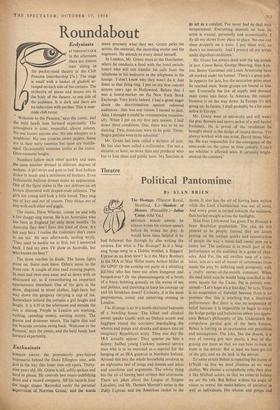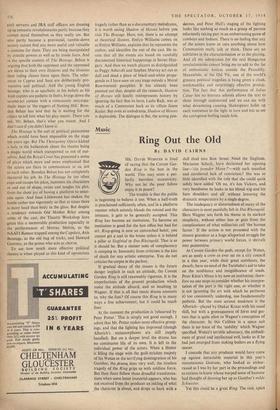Theatre
Political Pantomime
By ALAN BRIEN The Hostage. (Theatre Royal; Stratford, E.)—Shadow of ,Heroes. (Piccadilly.)--Julius -Caesar. (Old Vic.) BRENDAN BEHAN admits he always writes his curtain speech before he writes the play. It would have been helpful if he had followed this through by also writing the reviews. For what is The Hostage? Is it a Sing- sing Synge-song in a Dublin brothel, a Beggars' Uproar in an Irish stew? Is it the Marx Brothers in the IRA or Max Miller meets Arthur Miller at the GPO? Or the coming-out party of a whistling jail-bird who has been too often hungover and hanged-over? Or the phantasmagoria of a broth of a buoy, bobbing queasily on the waves of sex and politics, and clowning to keep his courage up and his breakfast down? Certainly, it is the most preposterous, comic and unnerving evening in London.
The Hostage is set in a bomb-shattered bedroom of a bawding house. The kilted. and cloaked owner speaks Gaelic with an Oxford accent and bagpipes round the corridors marshalling the whores and pimps and drunks and queers into an imaginary Republican army. Then one day the IRA actually appear. They quarter on him a skinny, baffled young Cockney national service man who is to be executed as a reprisal for the hanging of an IRA gunman in Northern Ireland. Around this boy the whole househeild revolves in an eightsome reel of songs and dances and jokes and anecdotes and arguments. The whole thing has the air of having been written that afternoon. There are jokes about the League of Empire Loyalists, and Mr. Dermot Morrah's series in the Daily Express, and the American rocket to the own. ence, age a not actors cities on a f the char- ca re- from with When n the con- ['here is no trical )n of enjoy ppre- h the ceur, dices is a dis- ok at m rid me of need play elieve ;le of es as s and moon. It also has the air of having been WI while the Lord Chamberlain was out of I And every point is turned towards the audi then hurled straight across the footlights.
Miss Joan Littlewood has given The Host braw Brechtian production. The cast do pretend to be people. Instead they are putting on the surface quirks and eccentri of people the way a music-hall comic puts ftinny hat. The audience is as much part o performance as the audience in a game of ades. And Pat, the old swollen nose of a taker, acts as a sort of master of ceremonies inside the play by deflating each pomposity a crafty corner-of-the-mouth comment. ) the mad laird says he would hang crucified i town square for the Cause, Pat is politely cerned—`Let's hope it's a fine day,' he says. is no suspension of disbelief because there pretence that this is anything but a thea performance. But there is also no suspensic belief because it is impossible to begin to 1 the hodge-podge and hullabaloo unless you a ciate Behan's philosophy of life. Underneat compulsive jocular grin of the born fat Behan is forcing us to re-examine our preju and assumptions. The joke, like the dream way of turning grit into pearls, a way of guising our faces so that we can bear to lo them in the mirror. But at least we have gc of the grit, and we do look in the mirror. To some extent Behan is repeating the thei O'Neill—to live we need illusions as we clothes. We choose a sympathetic role, then it like Method actors, so that we come to we are the role. But Behan widens his an vision to reveal the make-believe of society well as individuals. His whores and pimp: civil servants and IRA staff officers are dressing up as romantic revolutionaries partly because they cannot stand themselves as they really are. But also partly because a provincial, tumble-down society cannot find any more useful and valuable a costume for them. They are being manipulated by outside powers as well as by inside fears. And in the specific context of The Hostage, Behan is arguing that both the oppressor and the oppressed are slaves to their own illusions and the illusions their ruling classes force upon them. The refer- ences to Cyprus and Suez are deliberately pro- vocative and political. And the young English hostage, who is as apathetic in his beliefs as his Irish captors are pathetic in theirs, brings down the second-act curtain with a consciously unsympa- thetic sneer at 'the niggers of Notting Hill.' Bren- dan Behan has said that he is waiting for the critics to tell him what his play meant. There you are, Mr. Behan, that's what you meant. And I don't care if you didn't know it.
The Hostage is the sort of political pantomime- which would have been impossible on the stage ten years ago. But The Threepenny Opera kicked a hole in the balderdash about the theatre being a magic world which transported us out of our- selves. And the Royal Court has presented a series of plays which more and more emphasised that the actors are there to communicate to 'us, not to each other. Brendan Behan has not completely mastered his job. In The Hostage he too often caps and recaps his jokes, hammers his characters in and out of shape, twists and tangles his plot, from the sheer joy of having a platform to enter- tain upon. And Joan Littlewood has shaken the bottle rather too vigorously so that at times there is more head than body in the glass. But despite a tendency towards Old Mother Riley among some of the cast, the Theatre Workshop have given this a memorable production especially in the performances of Murray Melvin, as the NAAFI Romeo trapped among the Capulets, Avis Bunnage, as the old bag of tricks, and Howard Goorney, as the ponce who acts as chorus.
To see how much more effective political theatre is when played as this kind of uproarious tragedy rather than as a documentary melodrama, it is worth seeing Shadow of Heroes before you visit The Hostage. Here, too, there is no attempt at theatrical illusion. Emlyn Williams comes on as Emlyn Williams, explains that he represents the author, and identifies the rest of the cast. He in- sists that all the events are based on carefully documented historical happenings in Soviet Hun- gary. And then we watch players as distidguished as Peggy Ashcroft and Stephen Murray act out as dull and dead a piece of black-and-white propa- ganda as I have seen on any stage outside a Moral Rearmament pamphlet. It has already been pointed out that, despite all the research, Shadow of Heroes still fatally misrepresents history by ignoring the fact that its hero, Lazio Rajk, was as much of a Communist hack as its villain Janos Kadar. But even as melodrama,Shadow of Heroes is deplorable. The dialogue is flat, the acting pon- derous, and Peter Hall's staging of the fighting looks like nothing so much as a group of parents reluctantly taking part in an embarrassing game of cowboys and Indians. There is no feeling that any of the actors know or care anything about how Communists really talk or think. There are no subtleties in the characterisation or in the playing. And all my admiration for the real Hungarian revolutionaries cannot bring me to add to the list of enthusiastic notices outside the Piccadilly. Meanwhile, at the Old Vic, one of the world's greatest political tragedies is being given a clean, workmanlike and surprisingly effective produc- tion, The fact that this performance of Julius Ccesar has no bravura soloists allows the text to shine through undistorted and we can see with what devastating cunning Shakespeare holds up each statesman to the light in turn and lets us see the corruption boiling inside him.



































 Previous page
Previous page